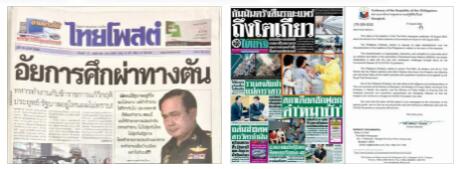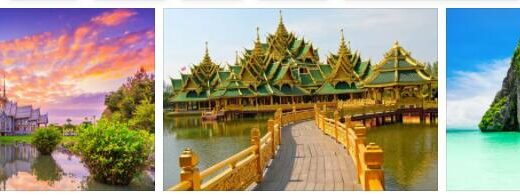Thailand Media and Human Rights
The media
The media in Thailand are strongly contested for power politics. A lively and sometimes critical newspaper landscape exercises a lot of self-censorship. The military governments controlled television and radio for a long time – until the creation of the first private broadcaster iTV after the democracy movement in 1992. But after Thaksin’s media group Shin Corp bought iTV, the government once again concentrated the media. The occupation of iTV was one of the first acts of the putschists in 2006. After the coup, however, the desire for independent reporting has risen sharply, which is reflected, among other things, in the spread of local radio stations and blogger sites. Right here sets State censorship is increasing – the Lèse Majesté legislation is increasingly being used, especially on the Internet. Overall, the freedom of the press is severely restricted. Reporters Without Borders ranks them at position 140 (out of 180) on their press freedom index. After the military coup in 2014, the military junta restricted media freedom even more. Initially, there was martial law, which completely undermined freedom of assembly and restricted media freedom. The media are encouraged to report only positively about the military regime. With the “Computer Crime Act” renewed in December 2016 is the Internet censorship amplified again. Critical posts on the net can be punished with long prison sentences. However, the new media also offer opportunities to avoid censorship.
Human rights
Although there is a constitutional framework in Thailand, the political conflicts of recent years have led to an increasing disregard for human rights. Under Thaksin’s rather autocratic government, the many illegal executions by the security forces during the “ war on drugs ” and the arbitrary arrests and killings in the south were denounced by human rights activists. After the 2006 coup, critical voices were silenced with the help of the law against libel and the new Internet law. In some cases activists have been imprisoned for many years. With the coup of 2014 the human rights situation has changed drastically deteriorated. Even the smallest signs of opposition are declared a crime. A small trader was forced by soldiers to take off his red T-shirt and a taxi driver was charged with lese majesty after a discussion with a passenger. Many politically critical people had to go into exile. In the meantime, dissidents are also being attacked or murdered abroad, as most recently in Laos.
Foreign policy issues
As an emerging industrial nation, Thailand is an important player in the Southeast Asia region. As the only alliance of the West on mainland Southeast Asia, Thailand’s relations with the neighboring states of Myanmar, Laos and Cambodia have long been characterized by low-threshold military conflicts. Since the 1990’s and under the Thaksin Shinawatra government, however, trade and investment relationships in the “ Greater Mekong Subregion ” have been in the foreground. The financially strong Thailand invests in Myanmar, Laos and Cambodia, among other things, in the energy sector, in telecommunications and in agribusiness. Thailand also plays a leading role in the Association of Southeast Asian Nations ASEAN. Relations with China are of increasing importance – both economically and politically.
Internationally, Thailand pursues a liberal economic policy and is represented in relevant organizations such as the WTO, the IMF and the Asian Development Bank (ADB). Historically good relations with the West are continued today with the USA, the EU and also Germany. The focus is on economic relationships, which are to be deepened with new trade and investment agreements. Some of these bilateral negotiations are viewed critically, partly because stricter patent rights could make access to HIV drugs more difficult. The negotiations between the EU and Thailand in particular are closed led to increased protests by civil society and the FTA Watch network. But military-strategic aspects also play a role. In the “war on terror”, Thaksin sent troops to Iraq and police to southern Thailand. Under his repressive policies, a simmering dispute over autonomy exploded in the provinces of Patani and Narathiwat.
The domestic polarization also affected relations with neighboring countries, as the conflict over the Preah Vihear temple shows. The temple was built under the Khmer ruler Suyarvarman II in the 12th century. When UNESCO declared the temple a World Heritage Site in 2008, the Yellow Shirts organized a demonstration for the ” return of the temple ” to Thailand. The situation escalated to the border war between Thailand and Cambodia in which dozens of soldiers died. The recent coup and the ongoing violation of basic human rights have isolated the military junta from foreign policy. The EU has suspended official visits to and from Thailand and the signing of trade agreements. Prayuth tries to break this isolation with visits to the ASEM meeting in Milan 2014 and Paris 2018. In Milan he was received by hundreds of demonstrators, which the regime denies as being invented. Protests also took place in Paris and London in 2018. Donald Trump, however, “is honored” to meet the dictator Prayuth in 2017.



